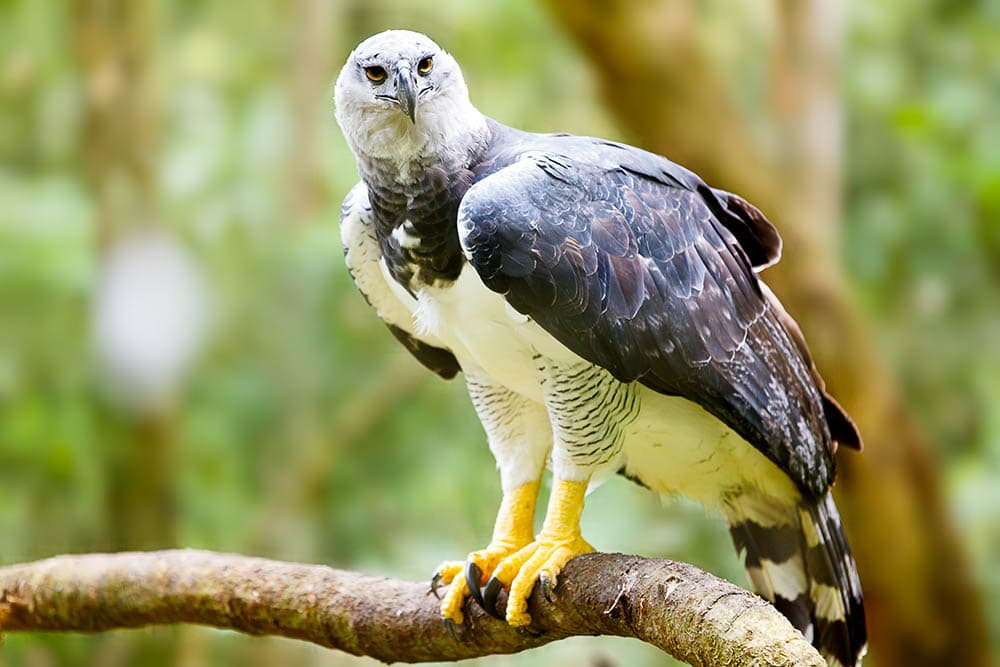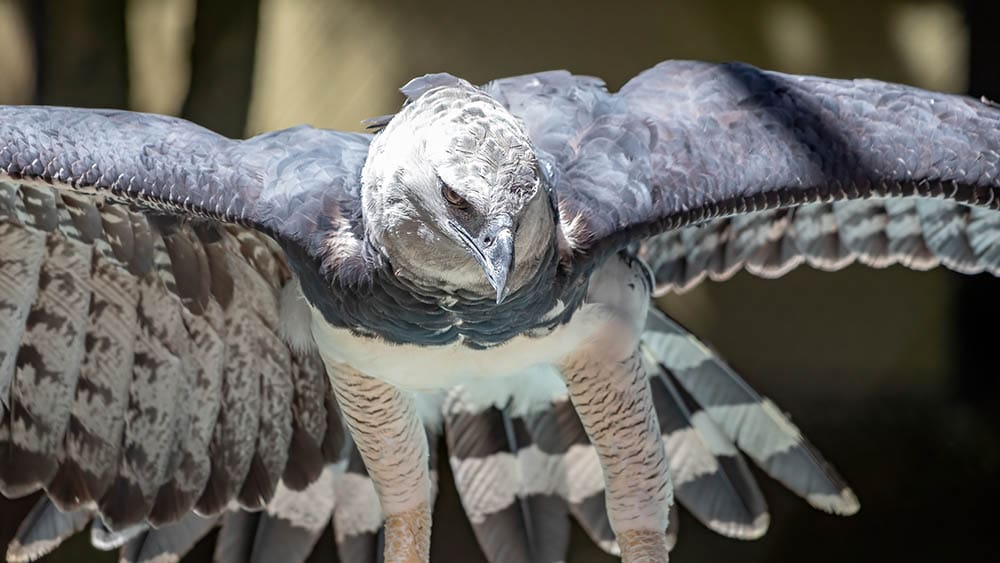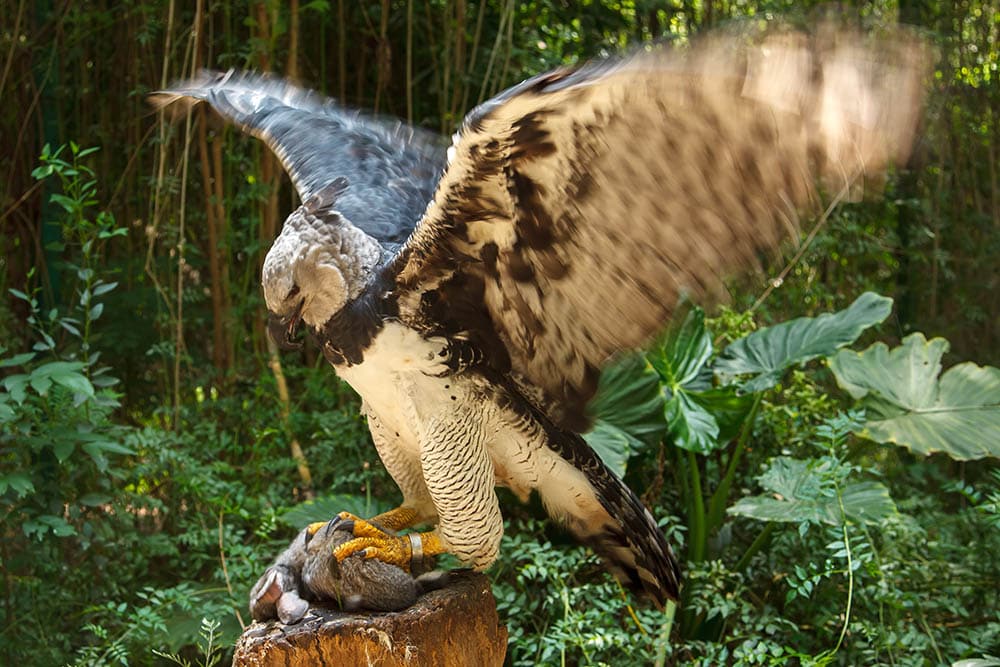Harpy Eagle Wingspan: How Big It Is & How It Compares To Other Birds
Last Updated on

There are a lot of different bird species in the world. Some are small enough that we don’t even give them a second glance, but others are so enormous that it seems impossible for them to even exist. The Harpy Eagle is considered the most powerful eagle in the entire world. Its enormous body and thick talons make it the perfect predator to soar the skies. That also means that its wingspan is one of the most impressive of all birds.
| Species name: | TabHarpia harpyjale |
| Population: | 20,000 – 50,000 individuals |
| Range: | Mexico to northern Argentina |
Most of the wild Harpy Eagles alive today are found in rainforest habitats around southern Mexico and reaching down to northern Argentina. This predatory animal prefers to feast on medium-sized arboreal animals like monkeys, sloths, opossums, deer, foxes, toucans, and others. With prey that size, it’s easier to comprehend just how big this bird is. Even though most people think these are the largest eagles to exist, there are many factors to consider making that statement. Even though they are shockingly large, these eagles are only tied for the tallest eagle in the world, but do not actually have the largest wingspan. Harpy eagles typically stand about 3 feet tall. Their wingspans, however, are another story.

Harpy Eagle Wingspan
Harpy Eagles are some of the tallest birds in the world, meaning they have an impressive wingspan as well. In most bird species, the male is the larger of the two sexes. But in this species, the female is the larger of the two. The average male weighs 9.7 pounds, with most maxing out at 10.6 pounds. The females, though, average 18.2 pounds and max out around 19.8 pounds. This also means that the female’s wingspan is typically large. In general, the wingspan of a Harpy Eagle ranges between 5 and 7 feet, with most being around 6 feet long. Instead of soaring, their wings are shorter to help them maneuver through thick forests.
| Wingspan Range | Average Wingspan | |
| Male Harpy Eagle | 61–84 inches
155–213.4 cm |
70.8 inches
179.8 cm |
| Female Harpy Eagle | 61–84 inches
155–213.4 cm |
72 inches
182.8 cm |

How Is Wingspan Measured?
The way to measure a wingspan is easier than you’d think. This measurement is taken from one tip of one wing to the very tip of the other wing. Both the wing shape and wingspan are physical adaptations that affect a bird’s ability to fly. Some allow more stability in the air and are better for long distances, and others are better for quick and sudden changes in direction. Harpy eagles have shorter wingspans compared to their body size so that they can easily change directions through the trees of the rainforest.
Harpy Eagle Wingspan Compared to Other Birds of Prey
Even though the Harpy Eagle is one of the largest birds overall, there are other birds out there with much larger wingspans. The bird species that currently has the largest known wingspan is the Wandering Albatross, with its wings spreading almost 12 feet long. Of course, there are plenty of other birds with impressive wingspans as well. Let’s take a look at some of the birds of prey with impressive wings.
| Harpy Eagle | Wingspan Range | Average Wingspan |
| Andean Condor | 106–125 inches
270–320 cm |
114 inches
289 cm |
| Stellar’s Sea Eagle | 33–41 inches
85–105 cm |
37 inches
95 cm |
| Bald Eagle | 71–96 inches
180—244 cm |
80 inches
203 cm |
| Turkey Buzzard | 63–72 inches
160–183 cm |
72 inches
182 cm |

How to Identify a Harpy Eagle
Aside from size, both male and female Harpy Eagles are nearly identical in appearance. When they first hatch, Harpy Eagles are covered in a pure white down that grows very quickly. After about 4 months, their face and belly stay white while their back and breasts start to turn light gray. The wings and tails are mottled with black and gray. The plumage continues to change until the eagles reach adulthood around five years of age.
Adult Harpy Eagles have gray heads with black wings and backs. Their breasts have a black band, and the tails are dark with white bands. The entire face is a slate gray color with a ring of feathers that they raise and lower around their faces.
Related Read: 25 Most Beautiful Birds of Prey in the World (With Pictures)

In Conclusion
Harpy Eagles are extraordinary creatures that look as fierce in the sky as they are while attacking prey. Even though they are enormous, their wingspans are relatively short for their bodies due to decades of adapting to their environments. Even with their shorter wings, the wingspan on these eagles is some of the most impressive that you’ll ever lay your eyes on.
Featured Image Credit: MarcusVDT, Shutterstock
About the Author Hallie Roddy
Hallie is a proud nature and animal enthusiast and has been for as long as she can remember. She attributes her passion for the environment and all its creatures to her childhood when she was showing horses on weekends and spending her weeknights devoting her attention to her pets. When Hallie isn’t using her degree in English with a writing specialization to spread informative knowledge on pets and animals, you can find her snuggled up on the couch reading books or watching nature documentaries with her own pets.
Related Articles:
How to Collimate Binoculars: 9 Expert Tips
Binocular Magnification Chart: Numbers & Distances Compared
How to Clean a Refractor Telescope: Step-by-Step Guide
How to Clean a Telescope Eyepiece: Step-by-Step Guide
How to Clean a Rifle Scope: 8 Expert Tips
When Were Binoculars Invented? History, Today & Future
Monocular vs Telescope: Differences Explained (With Pictures)
Can You Use Binoculars to Look At Stars? How to Choose the Right Pair
